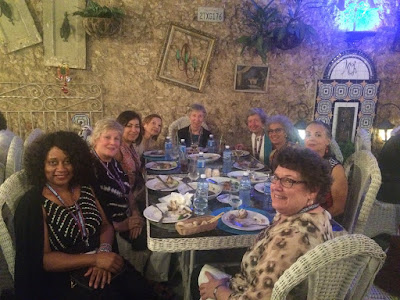I had the privilege of leading a
group of U.S. delegates on a People to People trip to Cuba. The goals of the
trip were to learn about the Cuban culture and their health care system and
outcomes, with particular emphasis on women’s health and the role nurses play within
the system. Our group of delegates was made up of nurses, physicians, psychiatrists
and a judge, representing clinical practice, education, research and
legislation. The depth and breadth of what we experienced and learnt far
exceeds the time we spent in Cuba. Prior to our trip, we reviewed articles
written by Cubans and non-Cubans, and during our trip, we listened to and
absorbed knowledge from Cuban leaders, physicians, nurses, politicians and
guides. We witnessed firsthand the different levels of health care that make
Cuba successful in increasing life expectancy, eliminating HIV, decreasing
maternal and infant mortality rates and decreasing amputations due to diabetes.
This particular blog will reflect on the group’s shared impressions and
learning experiences. Here are a few shared insights from our group:
- The hallmarks of the entire Cuban
political system are focusing on free education for everyone (mandatory until 9th
grade), preventative health care and insuring gender equity in all systems.
- Three levels of health care at
community, province and specialty hospitals based on individual needs, guarantee
access, prevention and better health outcomes.
- Cuba spent 10% of their GDP on
health, as compared to 17% for the U.S., and both countries have similar life expectancy
(78 years) and infant and maternal morbidity and mortality rates.
- Cubans have a very strong sense
of identity tied to their country and a great deal of demonstrated pride in
their achievements in spite of limited resources.
- Everyone we met was excited and
hopeful about a more normalized, reciprocal relationship with the U.S.
- Health diplomacy, sending doctors
and nurses to work in other countries, is used as a means to establish
solidarity, to promote good will, to generate revenues for the country, and
when needed, to help other countries as humanitarian gestures.
- Cuban family nurses and
physicians live in the neighborhoods they serve and personally know most of
their patients. They assess individual risk levels, they increase compliance
and they promote self-care. Together, health care professionals and patients
are responsible for health care.
- Intersectional collaboration and integrated services are values shared by all.
I am grateful to the members of
the delegation who traveled with me, experts and leaders in their own fields,
engaged and totally present throughout our adventure.






